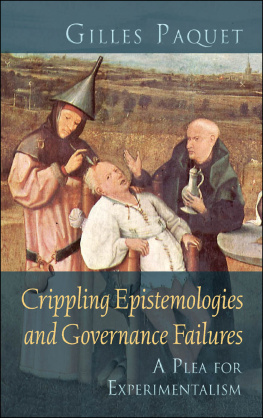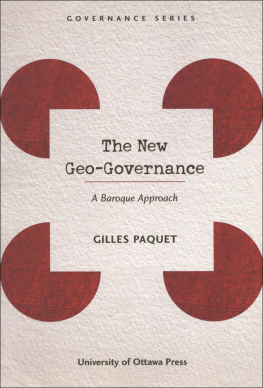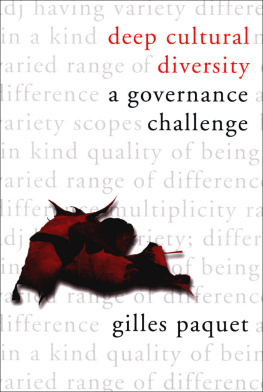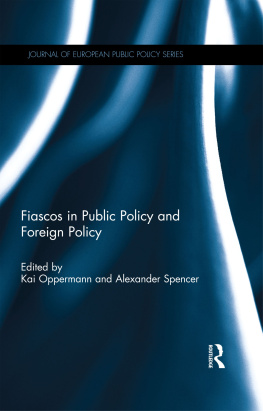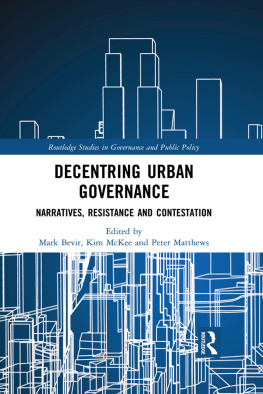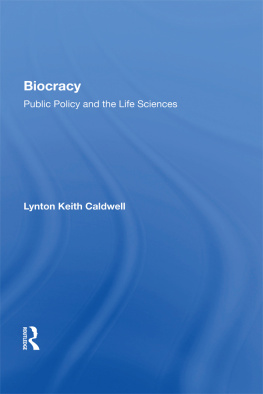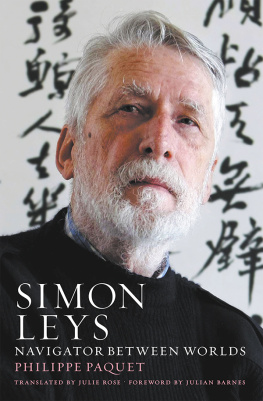Crippling Epistemologies and Governance Failures
GOVERNANCE SERIES
Governance is the process of effective coordination whereby an organization or a system guides itself when resources, power, and information are widely distributed. Studying governance means probing the pattern of rights and obligations that underpins organizations and social systems; understanding how they coordinate their parallel activities and maintain their coherence; exploring the sources of dysfunction; and suggesting ways to redesign organizations whose governance is in need of repair.
The series welcomes a range of contributionsfrom conceptual and theoretical reflections, ethnographic and case studies, and proceedings of conferences and symposia, to works of a very practical naturethat deal with problems or issues on the governance front. The series publishes works both in French and in English.
The Governance Series is part of the publications division of the Centre on Governance and of the Graduate School of Public and International Affairs at the University of Ottawa. This volume is the 22nd volume published in the Series. The Centre on Governance and the Graduate School of Public and International Affairs also publish a quarterly electronic journal www.optimusonline.ca .
Editorial Committee
Caroline Andrew
Linda Cardinal
Monica Gattinger
Luc Juillet
Daniel Lane
Gilles Paquet (Director)
The published titles in the series are listed at the end of this book.
Crippling Epistemologies
and Governance Failures
A PLEA FOR EXPERIMENTALISM
GILLES PAQUET
University of Ottawa Press 2009
All rights reserved.
Library and Archives Canada Cataloguing in Publication
Paquet, Gilles, 1936
Crippling epistemologies and governance failures:
a plea for experimentalism / Gilles Paquet.
(Governance series, 1487-3052)
Includes bibliographical references and index.
ISBN 978-0-7766-0703-0
1. Social epistemologyCanada.
2. Social sciencesPhilosophy.
3. Social sciencesMethodology. 4. Policy sciences.
I. Title. II. Series: Governance series (Ottawa, Ont.)
H61.P36 2009 300.1 C2009-900459-3
University of Ottawa Press
542 King Edward Avenue
Ottawa, Ontario K1N 6N5
www.uopress.uottawa.ca | |
The University of Ottawa Press acknowledges with gratitude the support extended to its publishing list by Heritage Canada through its Book Publishing Industry Development Program, by the Canada Council for the Arts, by the Canadian Federation for the Humanities and Social Sciences through its Aid to Scholarly Publications Program, by the Social Sciences and Humanities Research Council, and by the University of Ottawa.
the economist needs to be a great enjoyer of ideas
and a connoisseur of their means of expression,
a daring sculptor of argument, an eclectic,
and sometimes an heresiarch.
G. L. S. SHACKLE
Table of contents
INTRODUCTION
The difficult emergence of a new mindset
CONCLUSION
The difficulty of unlearning
Foreword
If a path to the better there be,
it begins with a full look at the worst.
THOMAS HARDY
This book reports on certain recent episodes in the long voyage of the human sciences from a focus on understanding to a fixation on methodism and back. A truly comprehensive treatise would go back to the birth of the human sciences, track down the corrosive effects of the ebbs and flows of positivism, scientism and methodism (but also of many other ideologies), bemoan the dark ages of the second half of the 20th century, and celebrate the signs of rejuvenation that one has been able to detect in the last little while. Such a long and arduous task will have to await a younger, more ambitious and more dispassionate travel writer.
My ambitions are much more limited. I wish only to look at the more recent segments of this evolution; to expose some of the slippages that the methodist drift in particular, but other drifts too, have generated in the world of the human sciences, in Canada and elsewhere; and to probe in a provisional way the renaissance of refurbished human sciences by underlining some of its most promising offshoots.
This search for more useful practical professional (not professionalized academic disciplinary) social sciences has led me to focus on the nihilistic era, when the effectiveness and relevance of the human sciences have been seriously impaired. This impoverishment of their perspectives through the ascent of crippled and crippling epistemologies of all sortsskewed theories of knowledge, flawed views of its nature that truncate the scope of what one may justifiably count as knowledge and generate false consciousnesshas had an important negative impact on the process of governance (Hardin 2002).
Finally, before we proceed, let me explain the crucial distinction between two aspects of the world of the professions that will be central to our discussion. Professionals are individuals who have not only academic knowledge but also practical knowledge. Professional knowledge is acquired in large part by doing (articling, residency, experience, and so on) out in the field. Such practical knowledge usually complements and enriches academic knowledge, making it more socially useful. I will refer to professional knowledge to connote the amalgam of this academic-cum-practical and socially useful knowledge, and to the professional social sciences as the enriched sort of intellectual capital and praxis that ensues. Professionalized academic disciplinary knowledge connotes the sort of knowledge generated by academic disciplines as ways of seeing according to codes and rules approved by professional disciplinary guilds, and enforced by union-type strictures in universities and colleges over the past fifty years or so. This last label connotes a very stylized, reductive and largely sterile version of professional knowledge.
MUD TIME, MENTAL PRISONS
Exposing such impoverishment and its consequences for governance is necessary if one is to help to engineer a full return to richer and less crippling epistemologies, and, consequently, to a fuller contribution by the professional human sciences to the design of more effective governance of human organizations and societies.
This fundamental slippage of the human sciences as a result of scientism was forcefully denounced by Friedrich Hayek in his Scientism and the Study of Society (1952). Without denying that the methods of natural science might be useful in some segments of the study of man and society, Hayek rejected the idea of reducing the human sciences, which are fundamentally moral sciences, to a natural science of man (Paquet 1985; 1987).
Hayeks warning came at the very moment of John Deweys death, when the social sciences had begun to shift their focus in a fundamental way from Deweys imperativein the beginning is the issueto a fixation mainly on the exclusive use of a conceptual toolbox supposedly able to offer incomparable help in handling these issues. This new fixation was built on a set of reductive assumptions that promised particularly important insights to those using this apparatus.

